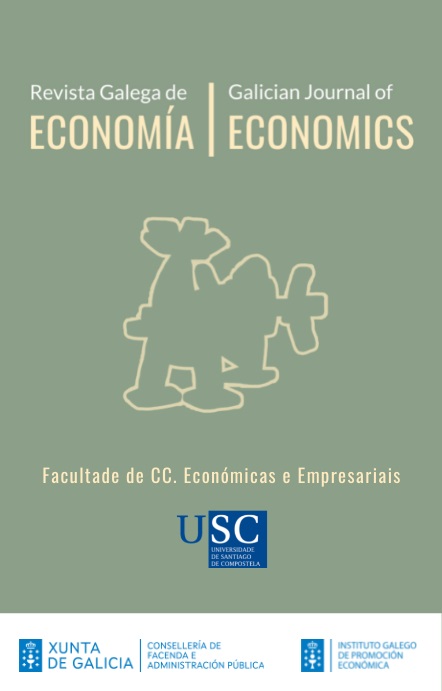Los requisitos educativos para el acceso y la formación continuada de los auditores
Contenido principal del artículo
Resumen
Palabras clave:
Detalles del artículo
Referencias
AMERICAN ACCOUNTING ASSOCIATION; AMERICAN INSTITUTE OF CERTIFIED PUBLIC ACCOUNTANTS (2012): The Pathways Commission on Higher Education: Charting a National Strategy for the Next Generation of Accountants. New York, NY: American Institute of Certified Public Accountants (AICPA). (3 de xaneiro de 2012). <http://commons.aaahq.org/files/0b14318188/Pathways_Commission_Final_Report_Complete.pdf>.
AMSTRONG, M.B.; KETZ, J.E.; OWSEN, D. (2003): “Ethics Education in Accounting: Moving Toward Ethical Motivation and Ethical Behavior”, Journal of Accounting Education, 21, pp. 1-16.
COMISIÓN EUROPEA (2010): «Libro Verde. Política de auditoría: lecciones de una crisis». [COM (2010) 561 final, de 13/10/10]. Bruselas: Comisión Europea. (4 de xaneiro de 2013). <http://eur-lex.europa.eu/LexUriServ/LexUriServ.do?uri=COM:2010:0561:FIN:ES:PDF>.
CÓNDOR LÓPEZ, V. (2012): “El papel de la universidad en la formación de los auditores”, News REA - Noticiario del Registro de Economistas Auditores, 11 (marzo), pp. 7-8.
DELLAPORTAS, S.; JACKLING, B.; LEUNG, PH.; COOPER, B.J. (2011): “Developing an Ethics Education Framework for Accounting”, Journal of Business Ethics Education, 8, pp. 63-82.
ESPINOSA PIKE, M.; ALDAZÁBAL ETXEBERRÍA, M.E. (2010): “Opinión de los profesores españoles sobre la incorporación de la ética en la formación de la profesión contable”, XVIII Congreso de EBEN España «Teoría Superior de Stakeholder». Bilbao: EBEN España. (13 de xaneiro de 2013). <http://www.eben-spain.org/docs/Papeles/XVIII/EspinosaAldazabal.pdf>.
FERRADA VERGARA, S.A.; VALENCIA POZO, V.M.R.; SOTO VILLAREAL, G. (s/d): Contador Público Auditor: competencias actuales y formación entregada. (3 de xaneiro de 2013). .
GONZALO ANGULO, J.A. (1995): “Presentación: La auditoría. Una profesión en la encrucijada de los noventa”, Revista Española de Financiación y Contabilidad, XXXV (84) (abril-junio), pp. 595-629.
GONZALO ANGULO, J.A.; GARVEY, A.M. (2005): “In the Aftermath of Crisis: The Post-Enron Implications for Spanish University Accounting Educators”, European Accounting Review, 14 (2), pp. 349-359.
GONZALO ANGULO, J.A.; LARRIBA DÍAZ-ZORITA, A. (1997): “Formación de auditores en España: el acceso a la profesión y la formación continuada”, II Jornada de Trabajo sobre Auditoría Contable, pp. 11-50. Santander.
GONZALO ANGULO, J.A.; TUA PEREDA, J. (1988) Introducción a la Contabilidad Internacional. Madrid: Ministerio de Hacienda, Instituto de Planificación Contable.
GUIRAL, A.; RODGERS, W.; RUIZ, E.; GONZALO, J.A. (2010): “Ethical Dilemmas in Auditing: Dishonesty or Unintentional Bias?”, Journal of Business Ethics, 91 (1, Suppl.), pp. 151-166.
LARRIBA DÍAZ-ZORITA, A. (1997): “Algunas reflexiones sobre ética, legalidad y deontología profesional”, Ensayos sobre Auditoría, pp. 209-244. (Libro en homenaje al Profesor Manuel Mier Menes). Madrid: Instituto de Auditores-Censores Jurados de Cuentas de España.
LARRIBA DÍAZ-ZORITA, A. (2005): “La formación de auditores”, V Jornada de Auditoría, pp. 49- -72. Madrid: ASEPUC/Universidad Rey Juan Carlos.
LIU CH.; YAO, L.J.; HU, N. (2012): “Improving Ethics Education in Accounting: Lessons from Medicine and Law”, Issues in Accounting Education, 27 (3), pp. 671-690.
MOUINCE, P.H.; MAULDIN, D.S.; BRAUN, R.L. (2004): “The Importance of Relevant Practical Experience among Accounting Faculty: An Empirical Analysis of Student’s Perceptions”, Issues in Accounting Education, 19 (4), pp. 399-412.
PALÉS ARGULLÓS, J.; NOLLA DOMENJÓ, M.; ORIOL BOSCH, A.; GUAL, A. (2010): “Proceso de Bolonia (I): educación orientada hacia competencias”, Educación Médica, 13 (3), pp. 127-135.






